“Ahhh…it burns!” my husband cried. He writhed around in pain after applying the lavender oil.
I wondered if he was just being melodramatic. (He’s been known to do that.) I had just used this oil on my 3-year-old a few days ago without any problems. Surely, lavender, often considered a mild oil, wouldn’t cause such irritation on a grown man. Would it?
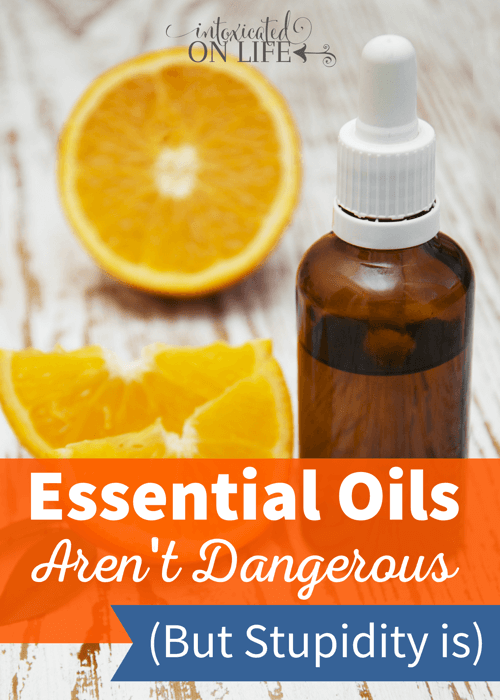
Sure enough, it did.
His skin continued to burn for a couple of hours, despite flushing the area with cool water (for reference, we learned later that it’s best to flush the area with a carrier oil instead of water. We didn’t know that at the time though) . What went wrong?
10 Rules for Safely Using Essential Oils
To this day, I claim essential oils aren’t dangerous. Stupidity, on the other hand, is.
We weren’t being smart with essential oils and taking proper precautions. We made too many assumptions when we should have been treating the oil we were using with more respect.
Essential oils are a very strong chemical compounds. As such, you need be smart with how you use them. You wouldn’t use a prescription from your doctor without reading on proper usage, would you?
1. Proper dosage and dilution are essential!
This is one place I went wrong in the above true story. I assumed that lavender was fine to use on the skin without dilution. Despite the fact that some sources say that lavender can be used “neat” (i.e. undiluted), no oils should be used on skin without diluting in a carrier oil.
Dilute oils unless a professional tells you not to. And even if a professional tells you to use a particular oil neat, try it on a very tiny spot in case you have a reaction to it. People can have different reactions to essential oils, so it’s always best to be on the safe side!
Some oils are more effective when inhaled or used in a compress. Be sure to do your research and find out the proper dosage however you are using your oils!
2. Use quality oils.
This is the section where you expect me to tell you to only use XYZ oil because they’re the only pure oil, right? Nope. Not going there. I’m not one who believes there is only one pure oil on the market.
I do, however, believe there are some oils that are not quality and you need to be careful. Given the fact that essential oils are very concentrated and powerful, you don’t want to use oils that are contaminated or from plants that were grown with pesticides. Yuck!
I don’t believe there is one company that has the corner market on quality oils. Do your research and decide for yourself.
Learn more about how I got started with oils, and my favorite brand in this post.
3. Consider the age and status of the person the oils are being applied to.
Are you a mama trying to get pregnant? Or maybe you’re pregnant or breastfeeding or wanting to use oils on your infant or children. These are all special classes of individuals requiring extra research.
Before you use oils on yourself or others falling in these categories, do some extra research. Don’t assume you can use oils the same way with everyone, take extra precautions!
4. Beware of skin sensitivity and irritation.
If you’re placing oils on the skin, be sure you use a skin patch test. As our above story illustrated not everyone reacts to oils the same way! Our 3-year-old had no problems with an oil that my husband reacted very fiercely to.
Use a skin patch test even for oils that aren’t considered “hot.” Just place a very little bit of oil on the skin and see if there is any sensitivity or irritation. If it is, you may need to consider a different application (possibly use of a diffuser) or diluting the oil even further.
5. Watch out for phototoxicity!
Essential oils can make your skin more sensitive to the sun? Whoda thunk? It’s true. Below are a list of oils that are known to be phototoxic. If you use these oils, just be sure to protect your skin from the sun (or tanning booth) for at least 12 hours after using them. Below is a partial list of oils that are known to be phototoxic.
- Angelica root
- Bergamot oil
- Cassia
- Cumin
- Dill
- Grapefruit
- Ginger
- Lemon
- Lime
- Tagetes
6. Keep oils away from flames.
Essential oils are highly flammable. Don’t use them around candles, fires, lighters, or pretty much anything that might cause flames. Nuff’ said.
7. Talk to your doctor about interactions.
There isn’t a lot of published information on drug interactions. If you’re taking regular medications or supplements, you should talk to your doctor about possible interactions with your essential oils.
If you have any major health issues, it’s also a good idea to talk to your doctor. Better to be safe than sorry!
8. Keep oils away from children and animals.
Don’t leave your oils sitting where your kids or animals can get into them. Oils aren’t a playtoy, as you can see from this list. Learn more about using essential oils with dogs here.
9. Keep Oils away from all body orifices
Don’t try to get creative with your oils. Be sure to keep oils away from your eyes, ears, mouth…and any other body openings.
10. Don’t use a new oil without doing research.
Essential oils aren’t something to mess around with. Please don’t use them haphazardly.
I’ve read numerous articles about individuals who have been severely hurt by essential oils. Does this mean oils are dangerous? No. You need to use your smarts when dealing with oils and follow safety guidelines.
Resources for Your Essential Oil Research
Of course there are plenty of online sources, but I don’t think anything can beat a good reference books. Below are a few books you may want to snag if you’re serious about researching essential oils.
- The Encyclopedia of Essential Oils
- The Complete Book of Essential Oils and Aromatherapy
- Aromatherapy for Health Professionals (if you’re looking for a more scholarly book)
- Essential Oil Safety
Free Download: Mom’s Essential Oil Cheat Sheet
Would you like a resource to help you learn to use essential oils with your family? Download this free 3-page printable:
- Basic guidelines for using essential oils around kids
- A list of safe, kid-friendly oils essential oils
- Helpful essential oil recipes
Click the link or image below to download the 3-page Mom’s Essential Oil Cheat Sheet. I’ll follow it up with more resources and free printables to help you on your essential oil journey. Grab your copy now!

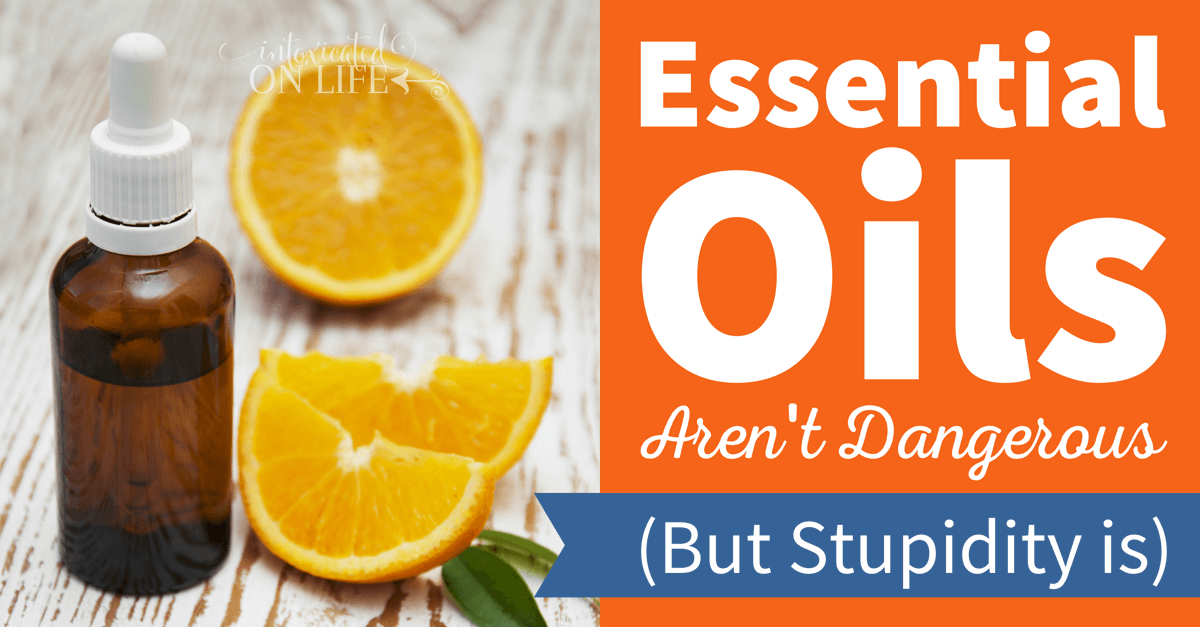
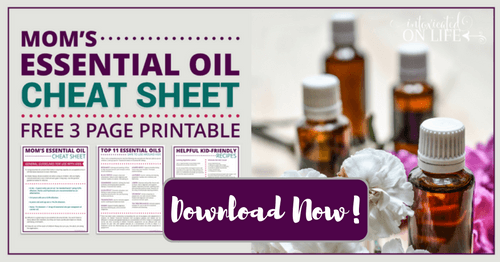
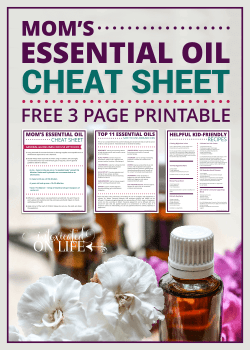
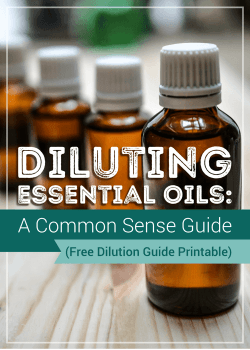
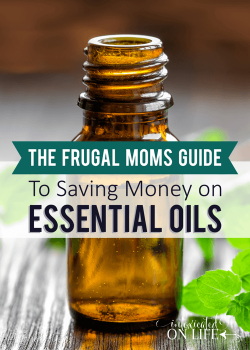
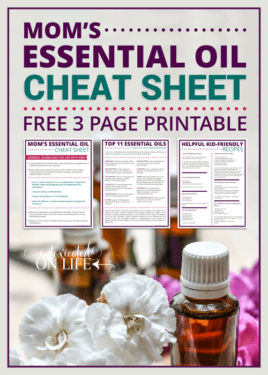





If an oil “burns” your skin or you get it in your eyes accidentally; use a carrier oil; olive, coconut, grapeseed, almond, etc, never water. Water spreads the EO and drives iit n deeper into the skin, making the reaction worse. The carrier oil slows absorption. ☺ been there, done that!
Thank you for commenting! We actually learned that some time after this incident, but I neglected to add that to the post. I’ve gone back and edited it so others don’t make the same stupid mistake we did 🙂
Ok….TRUE STORY…this SAME thing happened to me last week. My husband thought I was going crazy. I took a bath with epsom salts, baking soda, and sweet orange essential oil. I must have gotten a bit carried away when I put the essential oil in the tub because IT BURNED!!! FOR HOURS!!! It didn’t start right away, but once it started burning there was nothing I could do. So yes, you can call me stupid. I should definitely have been more careful.
Oh no! It’s crazy how people react so differently to oils. One of my brothers used to use lavender in all of his baths and it didn’t bother him at all. So strange!
Love your website and all your info on health topics! I have been on a journey of learning more about healthy eating and nutrition for five years now and appreciate all your research.
I have been using essential oils now for three years and love them. Sometimes you have to learn by trial and error. I must let you know, if you haven’t already learned is that water actual makes the oil set into the skin faster. If this happens again use coconut oil or another carrier oil to help ease the burn. I do this and it stops because the oil helps to kind of release it like one of those time release pills ;).
Thank you so much for your kind note!
Yes, thank you for pointing out. We did learn that lesson, some time after this event happened. I didn’t think to put it in the intro, but have since gone back and added it so others don’t make the same stupid mistakes we did!
Water makes the essential oil go in deeper which is why it burned in the bath and why it didn’t help your husband. If you apply an essential oil neat and find it burns you should apply oil over it (fractionated coconut oil, olive oil, almond oil…) to dilute. If you want an oil to go in deeper in the tissue apply water (you can even put a warm compress over it). Hope this helps.
Wanted to comment on your post. You mentioned that you had flushed the lavender with water and it continued to burn for hours. Water will drive the ‘burn’ deeper. Just a reminder, ‘like’ dissolves ‘like’. To deal with a ‘too hot’ oil experience, just ‘dilute’ the oil further with any carrier oil such as olive or coconut. I actually use lavender ‘neat’ all the time, especially for burns. It is almost miraculous at times reducing a cooking injury turned to a blister, practically healed in two days time. It is important to use common sense, such as treating a burn by soaking in cool/cold water until the burn is no longer feeling hot, otherwise the oil will seal the burn like butter does and cause it to hurt more. I have put drops of lavender in the soaking water to get the healing started faster. Just our experience.
Thanks for the note! Yes, some time after this incident happened we learned that using a carrier oil is the best way to deal with this. I didn’t mention it in the intro but have gone back and added that now so there isn’t any confusion.
The lesson we learned was, just because I and my kids might not be sensitive to lavender oil and it’s not considered to be a “hot” oil, that my husband is very sensitive to it. It’s important to do spot testing even with oils that aren’t considered to be “hot” because there are individual differences!
I have wondered about essential oils. I’ve heard of all the good things but this is a great balanced article about the need to be cautious too. Thanks for sharing.
You’re so welcome! It is very important to be careful with essential oils and take good safety precautions, but they can be a fantastic addition to everyone home.
A very good article with a self-deprecating sense of humor. Essential oils are on my bucket list of things to look into, especially when I get around, someday, to making soap from our goat’s milk.
Thank you for the tips. Duly noted and hopefully remembered at the right time.
Soap making has been on my bucket list too! I was hoping to try it out last summer, but time got away from me. Maybe this summer 🙂 Glad you enjoyed the article!
Putting into orifices also means don’t ingest unless under direction from a doctor or naturopath or other licensed health care provider! Even in a capsule! Sorry, EO safety is my soap box and it bothers me to see capsule recipes all over Pinterest. 🙂 EOs work, even without ingesting!
I totally agree! I think there are very few instances when ingesting oils is necessary. Topical and distillation is what we do 99% of the time.
I have used Lavender , Clarey Sage, Chamomile with Jojoba oil to stop severe muscle jerks .This is the only thing that has stopped the problem and the pain.I use them in a defushier I hope I am able to use them always.
Also, some oils cannot be used on young children, so make sure to check the recommended age before use.
I have been doing oils and Herbs for more than 5 years. I still have to learn as things change. Im constantly checking for anything new about oils I use. So glad I found your site. anxious to learn more.